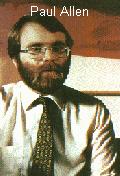 contd........
contd........With Bill Gates, he co-founded Microsoft (initially "Micro-Soft") in Albuquerque, New Mexico, in 1975, and began selling the BASIC interpreter. Apple commissioned Microsoft to supply a version of its BASIC for the hot-selling Apple II. Allen spearheaded a deal for Microsoft to buy an operating system called QDOS for $50,000. Microsoft won a contract to supply it for use as the operating system of IBM's new PC. This became a foundation of Microsoft's remarkable growth. Allen resigned from Microsoft in 1983 after being diagnosed with Hodgkin's disease which was successfully treated by several months of radiation therapy and a bone marrow transplant.
In 1984 he founded Asymetrix, a software development company based in Belleuve, Washington, to make application development tools that nonprogrammers can use. Asymetrix later went on to become Click2learn.com and yet later merged with Docent to become Sum Total System (2004). In the 1990's the company began to specialize in software for developing and delivering computer-based learning.
1992 Allen started Starwave, a producer of online content sites. Starwave did such great work for ESPN SportsZone and ABCNews.com that Disney (NYSE: DIS) bought it for a total of $350 million last year.
1998 In April Allen buys Marcus Cable, the nation's 10th largest cable company, for $2.8 billion--his biggest investment to date. Also this year Allen grabbed a stake of the Internet video-sales market with his purchase of Hollywood Entertainment. And he took another software group public. This time it's Asymetrix Learning Systems, maker of products for online classes.
On September 28, 2000 - Microsoft Corp. announced that Paul Allen is assuming a new role as senior strategy adviser to top Microsoft executives. The company also announced that Allen and Richard Hackborn have decided not to seek re-election to Microsoft's board of directors at the company's November shareholder meeting. In November 2000, Allen resigned from his position on the Microsoft board.
In September 2003, Allen founded the Allen Institute of Brain Science pledging $100 million in seed money to the Seattle-based organization. Its inaugural project is the Allen Brain Atlas, a map of the human brain which will be made publicly accessible. The Brain Atlas is a component of the loosely formed Human Cognome Project.
Starting in 2003, Vulcan Ventures began funding Project Halo, an attempt to apply Artificial Intelligence techniques to the problem of producing a digital Aristotle that might serve as a
mentor, providing comprehensive access to the world's knowledge.
In December 2003 he announced that he was the sponsor behind the SpaceShipOne private rocket plane venture from Scaled Composites, as part of the ANSARI X PRIZE competition. In June 2004, SpaceShipOne became the first successful commercial spacecraft when it passed the 100 kilometre threshold of space.
Allen is a major contributor to the SETI, or Search for Extra-Terrestrial Intelligence project.
He is also the founder of the Experience Music Project, originally inspired by his interest in a museum to house his considerable collection of Jimi Hendrix memorabilia.
Allen runs a venture capital firm, Vulcan Ventures, and has created the Experience Music Project, a museum of music history, in Seattle, Washington.
He owns (through Rose City Radio Corporation) some Portland radio stations. When he heard Seattle's Cinerama movie theatre was about to shut down, he bought, restored, and updated it into a showplace for movies of all formats. He is also one of the principal financiers behind the SETI project, having stepping in to rescue the project when NASA stopped funding it in the 1990s. Allen owns the Flying Heritage Collection.
Currently Allen is the owner of the Portland Trail Blazers (an NBA basketball team) and the Seattle Seahawks of the National Football League. He also owns Rose Garden Arena, the home court of the NBA Blazers team. Due to declining attendance in 2002 and 2003, as well as difficulties renegotiating the terms of a 1993 loan, the Rose Garden Corporation filed for bankruptcy on February 27, 2004.
In June of 2004, Allen opened the Science Fiction Museum and Hall of Fame, located at the
Experience Music Project.
He is also the winner of many awards, notable amongst them are Life-Time Achievement Award by PC Magazine and was inducted into the Computer Museum Hall of Fame.
All of the above scrap has got some genuine source over the web. But still there may be discrepancies which I assure are non-intentional. Anyone pointing out corrections or adding more info about this wonder-guy is whole-heartedly welcome.
No comments:
Post a Comment